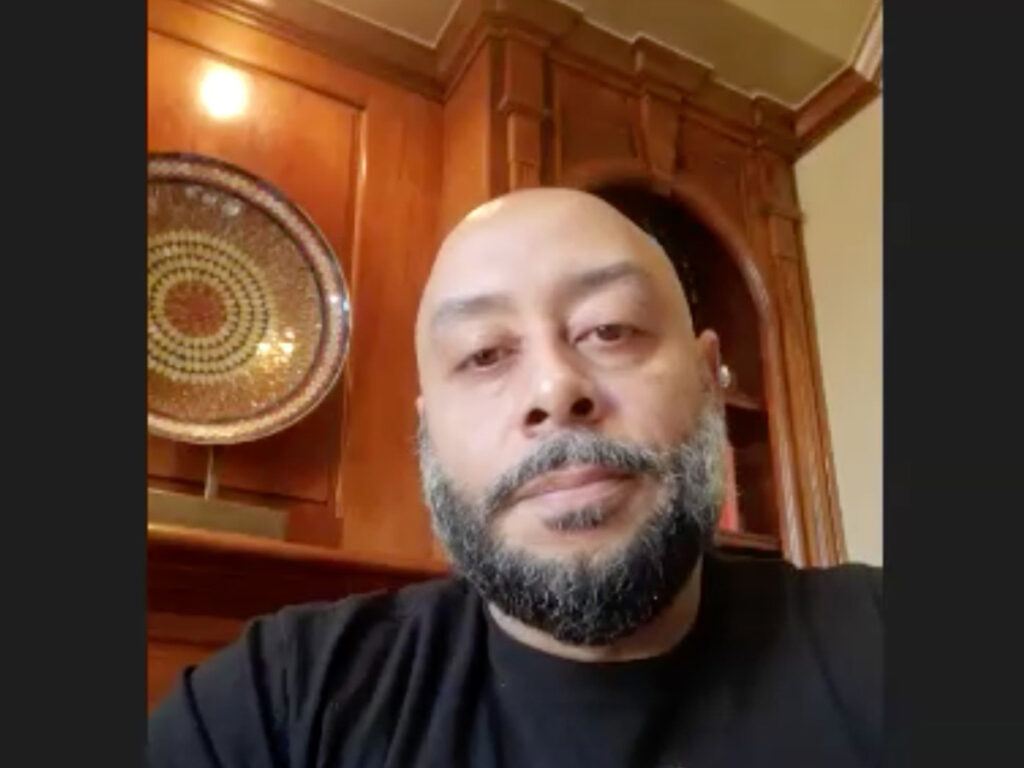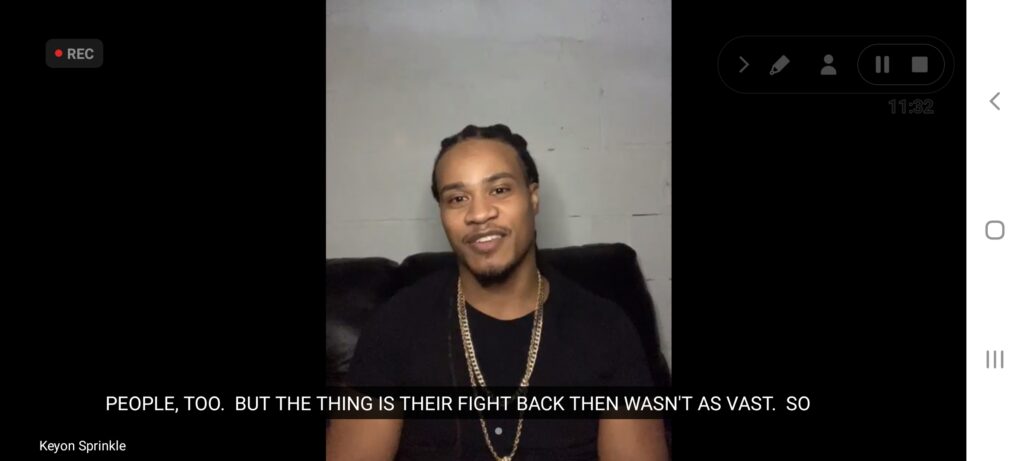Social Justice Academy Panel Examines Incarceration, Activism, Education

By Zenebou Sylla ‘22
Emerson’s Intercultural Student Affairs wrapped up this year’s Social Justice Academy Friday, March 5, with a conversation around mass incarceration and the school-to-prison pipeline with keynote speaker Raymond Santana of the Exonerated Five.
Joining Santana on the panel discussion were Keyon Sprinkle, a Boston-area exoneree, and Luz Villar, a former aide to Congresswoman Ayanna Pressley. Clarissa Carillo ’24, an Intercultural Student Affairs student worker, moderated.
The Exonerated Five were five Black and Latino teenagers who were wrongfully convicted of assaulting and raping a white woman in Central Park in 1989. All were exonerated in 2002 after a man serving a life sentence in upstate New York confessed to the crime.
The panelists spoke, among other things, about how their experiences with the prison system changed their perspectives and drove them to help out their communities where they can.
Villar, who identifies as an Afro-Caribbean of Puerto Rican and Dominican descent, has used her personal experience of being in foster care from the ages of 9 to 12 with a father who was incarcerated, to shape her work in prison reform and fighting injustice today.
“I don’t think the infrastructure is there, socially, for our people to come home, [to] strengthen our families… so that is why I feel like it’s my role to come in this work and not only speak from my experience, but also bring in the professional aspect of it,” Villar said.

With this year’s Social Justice Academy theme being mass incarceration and abolition, the panelists dug into what those two words mean and how people in their communities have been systematically engineered into the positions they find themselves in today, but also how these two topics can spark action and change.
Stories as catalysts of change
Santana, who was tried as a juvenile and served more than five years before being released, said sharing his personal story publicly advances the conversation around mass incarceration because every aspect of it illustrates the inherent problems and issues.
“I mean, if you look at our [Santana and Keyon] story, …it touches perfectly when it comes to the criminal justice system. [I]t deals with … mass incarceration itself, it deals with interrogations by police…, it deals with how we conduct the job and how we conduct interviews with juveniles, and so touches a vast spectrum,” said Santana.
There are many resources that all three panelists mentioned that they wished the system had such as support groups, an understanding of the rules and ethics to access certain information, equitable distribution of education, and support of mental health resources, such as counseling or therapy, that can provide a comfortable space for conversations.

Education is Key
It took two years before Sprinkle could make his way into GED courses. He found that it was the community of men in these institutions that helped him learn about the life he could create for himself, and encourages others to do the same for themselves when they can’t find the right resources for their needs.
“If you feel like these are things that you would like to see there, build them there,” said Sprinkle.
Santana was also able to follow his own path toward restoring his education. While in prison, he did a trade program in auto body repair, obtained his GED, went through pre-college, and ended up with an associate’s degree.
“But when I got into college, I went into this class, it was a Black studies class… those books would become the foundation of who I would become, and that’s Raymond, the activist. And so that point of education became so pivotal to me in my life,” said Santana.
Sprinkle cited miscommunication between the BIPOC community and the people who police their environments as a flaw in the system.
“We need more people culturally understanding [us], some type of cultural training, and some type of de-escalation of ways that stops us from being to become law enforcement and things like that because it will help a lot, I believe,” said Sprinkle.
Once an incarcerated person is released, Santana and Sprinkle explained that there also is a lack of resources and preparation – how to get a job, how to budget money — when it comes to integrating back into society.
All three panelists pointed out that talk from the top about social justice needs to be bolstered with financial resources in budgets.
“It’s easy to be loose with words, harder to implement them, and way harder to come up with solutions,” said Sprinkle.
Looking Ahead
After 20 years of protesting his innocence, and being released for just over a year, Sprinkle realized that through this he built great relationships, and wants to take this time to foster that in the ones who believed in him throughout his journey.
“I just really want my family to just love me…and the people that I touched, I just want them to know my presence was there,” said Sprinkle.
For Villar, it was her time working with Pressley that inspired her to pursue her master’s degree in public policy management at Georgetown University. She also currently serves as a mentor to young kids at risk in the foster care system through the therapeutic work of hip-hop and graffiti.
“I want my legacy to be [that] I lived and spoke my truth and that it was all conducive to the liberation of our people, no matter the consequences,” said Villar. “My spark came back… public service, that’s my career, that’s my passion and purpose, that’s where I’m supposed to be. So now let me sharpen my tools, add a couple more to my belt, and continue on this work.”
Santana said it is ultimately the people who will continue to uplift their communities and use their voices to elicit change.
“I hope I’m alive to see that, when these young generations come and take over the world, because that’s part of our investment. This is why me and Keyon will tell our story. We want these young people to take that story and use it, amplify their voices, overcome obstacles to make sure that what happened to us, doesn’t happen to them or someone they know,” said Santana.
“You bring your talent and passion and bring that to the movement…And we know everybody can’t be on the front lines. Whatever you do, you do. That’s what we want you to do. When I say we got to occupy all spaces, we have to occupy all spaces, right? Because those policy procedures and rules are not going to go away on their own.”
Categories